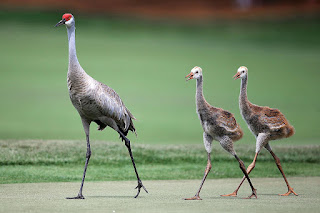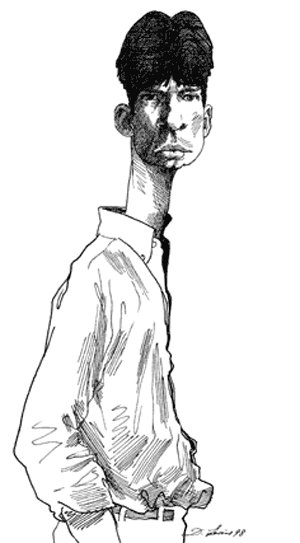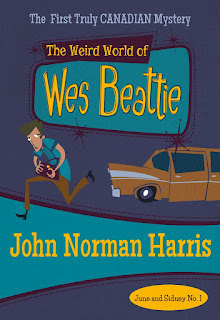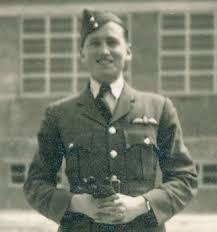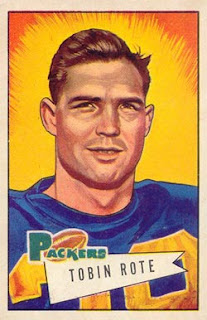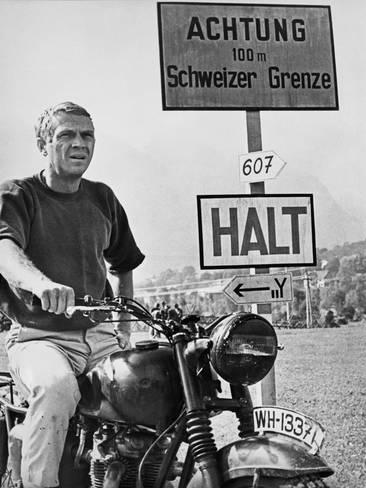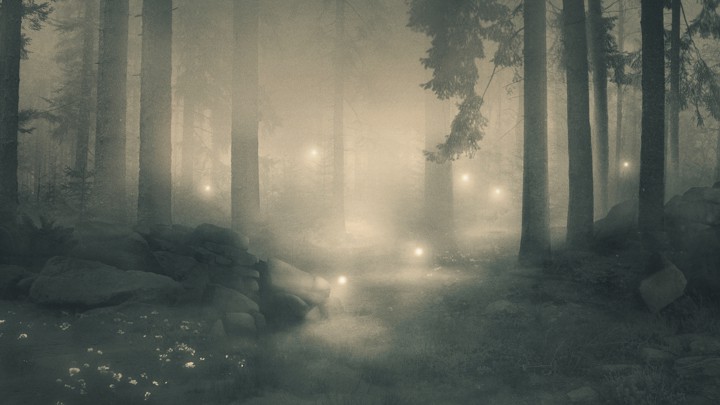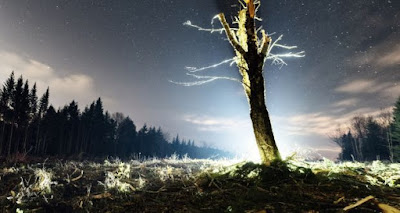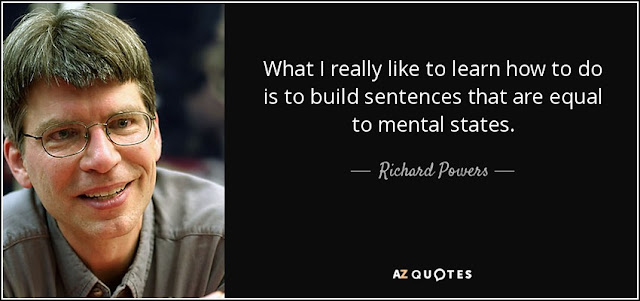I doubt I'd
have been able to discuss The
Echo Maker
if I hadn't found something I thought was wrong with it. It's almost
too daunting. "You stagger out of Powers’s novel happy to find
yourself, like Scrooge the morning after, grasping your own bedpost,
saying 'There’s no place like home,'" says Margaret
Atwood in The New York Review of Books,
"and
hoping you still have a chance to set things right."
And Patrick
Ness in The Guardian:
"His books seem wrought rather than written, and try as he
might, he can't help but make you feel just that little bit stupid."
I feel a
little bit like Homer Simpson would trying to write about Finnegan's
Wake,
but I’m too stubborn to shirk making an effort, if only just to
stitch together some of the erudite observations by vastly more
sophisticated readers who dared to step forward and put them on the
record. The
Echo Maker,
after all, is a must read for anyone busy being born, not
busy dying (to steal shamelessly from a Nobel laureate).
And
for those readers perched on the edge of their seats eagerly seeking
an opening to accuse me of oversimplification with my
observations, I hereby address their indubitably accurate assessment
right here and now:
The core notion in both Richard Powers novels I've read—The
Echo Maker
and The
Overstory—condemns
the human species as having evolved too far for its own good. We've
come to know too much about too little, and too little about too
much. In even simpler terms, because our lizard brains continue to
call the shots despite what our higher intellect knows to be true, we
are doomed. Powers brings the humility to us more delicately with
this quote from Loren Eiseley's The
Immense Journey:
As for men, those myriad
little detached ponds with their own swarming corpuscular life, what
were they but a way that water has of going about beyond the reach of
rivers?
Be assured,
Powers is a preacher. A preacher in the mold of those 18th
century Boston Unitarian pulpiteers whose eloquent oratory nudged
statesmen, merchants, and the general citizenry to set their sights a
tad higher than base appetite and self-servitude. Morality for the
sake of a civil society was the impetus then. It was good for
everyone for each to be good. Not enough anymore, Powers contends. In
fact it's likely way too late for good by anyone to do most anyone
any good beyond the short-term illusion. As someone in the Bible must
have said or at least pondered, we've pretty much sealed our fate.
[MOMENTARY
INTERMISSION FOR WEEPING, EXCHANGING HUGS, BLOWING NOSES, AND
RETURNING TO SEATS TO LEARN WHAT RICHARD POWERS DID WRONG IN THE
ECHO MAKER]
Yes, I am
most grateful to have found something to carp about in this
incredibly, brilliantly overwhelming novel. It has to do with neither
plot, science, philosophy, conjecture, or fluidity of thought, all of
which contribute to the overall disquieting effect of The
Echo Maker.
My quibble is with the humble element of the writer's craft, about which I
will have more to say after a brief synopsis/discussion of the
astonishing features alluded to in the previous sentence. I probably
shouldn't have said "brief," as I doubt I can be as concise
as I, and you, most certainly would prefer. But please bear with me.
I shall try, we shall see.
Powers
brings his scenario of doom to us in the guise of several seemingly
disparate narrative rivulets, each engaging us in its own way as it
meanders through crises of purpose and identity edging incrementally
closer to the others with a momentum toward confluence
in a larger, more portentous story. A key to Powers's power is a
storytelling gift that enables him to deliver conclusions from his
boundless intellect in a palatable embrace accessible to curious
muddlers like me. And Powers understands the importance of story,
most likely more keenly than I, who without question would stumble
pitiably off the foot bridge to understanding his wizardry without
the rope of story to hold onto to steady my nerves. One of the
principal characters in The
Echo Maker,
a cognitive neurologist, emphasizes its fundamental importance:
Consciousness works by telling
a story, one that is whole, continuous, and stable. When that story
breaks, consciousness rewrites it. Each revised draft claims to be
the original. And so, when disease or accident interrupts us, we’re
often the last to know.
The novel’s
plot unfolds in the minds of three individuals besides the cognitive
neurologist:
a young man with brain damage who believes his sister is an imposter;
the sister, who tries mightily to convince him she’s real, and
Powers, constantly looking over everyone’s shoulder explaining what
they see and are thinking, And there’s the irritation for me:
too much ‘splaining and not enough showing. His kibitzing intrudes
needlessly, tediously, and, as one professional reviewer put it, the
prose lacks levity. Powers’s voice here brings to mind the
brightest kid in class forever displaying his superior knowledge. The
kind eager to explain in minute detail, without himself laughing, why
a joke is funny. Possibly the only aspect of human cognizance Powers
either doesn’t get or is blind to for its narrative value is
subtlety.
Yet these shortcomings are
mere nit specks in the extraordinary tapestry he has woven for us
to make his point that we just might yet have a miniscule chance of
getting our shit together in time to avoid flushing ourselves down
the toilet of extinction.
He uses as
an analogy the marvelously mysterious sandhill crane, known by the
very earliest Americans as “echo makers” for their unearthly
cries. “All the humans revered Crane, the great orator,” Powers
explains. “Where cranes gathered, their speech carried miles. The
Aztecs called themselves the Crane People. One of the Anishinaabe
clans was named the Cranes—Ajijak or Businassee—the
Echo Makers.
The Cranes were leaders, voices that called all people together. Crow
and Cheyenne carved cranes’ leg bones into hollow flutes, echoing
the echo maker.
“Tecumseh
tried to unite the scattered nations under the banner of Crane
Power,’ Powers tells us, “but the Hopi mark for the crane’s
foot became the world’s peace symbol. The crane’s foot—pie
de grue—became
that genealogist’s mark of branching descent, pedigree.”
These long-legged, graceful
dancing birds land by the hundreds of thousands every year in a
Nebraska marsh on their seasonal migrations. Two former lovers of the
brain-damaged man’s sister are adversaries over disposition of the
wetlands that host these legendary birds. One is a preservationist,
the other a developer scheming to build a tourist facility to
celebrate the birds in an ironic twist destroying their habitat.
“One
million species heading toward extinction,” says Daniel, one of the
sister’s lovers. “We can’t be too choosy about our private
paths.”
The
sister muses, “Something in Daniel mourned more than the cranes. He
needed humans to rise to their station:
conscious and godlike, nature’s one shot at knowing and preserving
itself. Instead, the one aware animal in creation had torched the
place.”
One might
think these details thicken the plot enough already. One would be
wrong. It gets plenty thicker. Much of The
Echo Maker
has to do with the brain, of humans and others. My Homer Simpson
wisdom ventures a guess that what Powers is doing with his dazzling
exposition of cutting-edge neurological science is to show us how
fractured we are, how amorphous and shifting is our sense of who we
are and what we are, and how terribly wee we are in the cosmic scheme
of it all.
Powers gives us science so
mind-blitzing we can’t help but wonder at its veracity, yet we know
from others who’ve done their Googling that it’s real. Anecdotes
of people whose lives have been horribly deranged by injury or
changes in their brain chemistry are enough to make me consider
wearing a football helmet
everywhere, even to bed.
Alright now
here’s something that if it isn’t true Powers ought to be tarred
and covered with crane feathers and made to get a better haircut. The
following whacked me especially hard upside the head because I had
exactly the described experience back in the day, although it wasn’t
induced in the same way. No stream of electrodes was employed;
mine came with the so-called illegal smile. Here’s the one with the
juice (big words be damned):
Consider
autoscopy and out-of-body experience. Neuroscientists in Geneva
concluded that the events resulted from paroxysmal cerebral
dysfunctions of the temporoparietal junction. A little electrical
current to the proper spot in the right parietal cortex, and anyone
could be made to float up to the ceiling and gaze back down on their
abandoned body.
Wondering
now if maybe that smile of mine (or its motivator) didn’t generate
a certain mellow sort of buzz in my right parietal
cortex. As it happened, I’d been watching Sam Ervin on TV gently
interrogating White House Special Counsel John Dean.
In
addition to the exhausting mystery of our brain, a more mundane
question hovers over one of the narrative threads in The
Echo Maker.
Mark, the brain-damaged man, doesn’t remember how he came to flip
his truck on a straightaway (albeit while driving some 80 m.p.h. at
night) leaving him trapped under the three tons of steel in a marsh
during the migrating sandhill crane layover. Author Powers gradually
feeds us random clues, which, as all good mystery yarns should,
merely awaken new questions and speculations as momentum builds to
the solution, which, I daresay, is a lollapalooza.
Did I say
there was no humor in The
Echo Maker?
I trust I didn’t put it quite like that. Something did give me a
pretty good laugh, before a sudden lump in my throat made the verbal
mirth sound a tad hollow. Here’s what caused the confusion:
“This
is it. Carhenge,” says the brain scientist to his female companion.
(They’re on a Nebraska road trip.) The huge gray stones turn into
automobiles. Three dozen spray-painted junkers stood on end or draped
as lintels across one another. A perfect replica. They are out of the
car, walking around the standing circle. He manages a pained
imitation of mirth. Here it is:
the ideal memorial for the blinding skyrocket of humans, natural
selection’s brief experiment with awareness. And everywhere,
thousands of sparrows nest in the rusted axles.
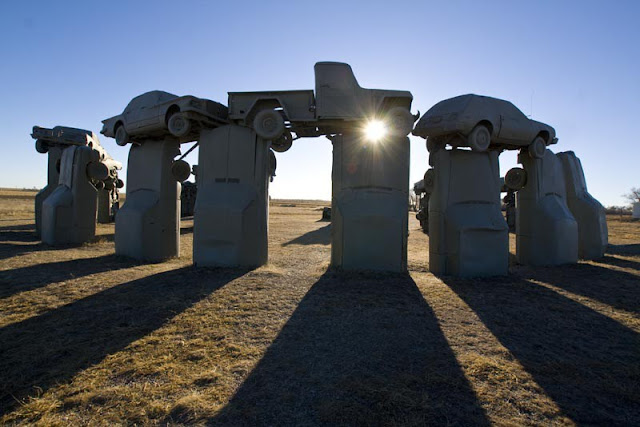 |
| Carhenge |
[For
more Friday's Forgotten Books check the links on Patti
Abbott's unforgettable blog]


